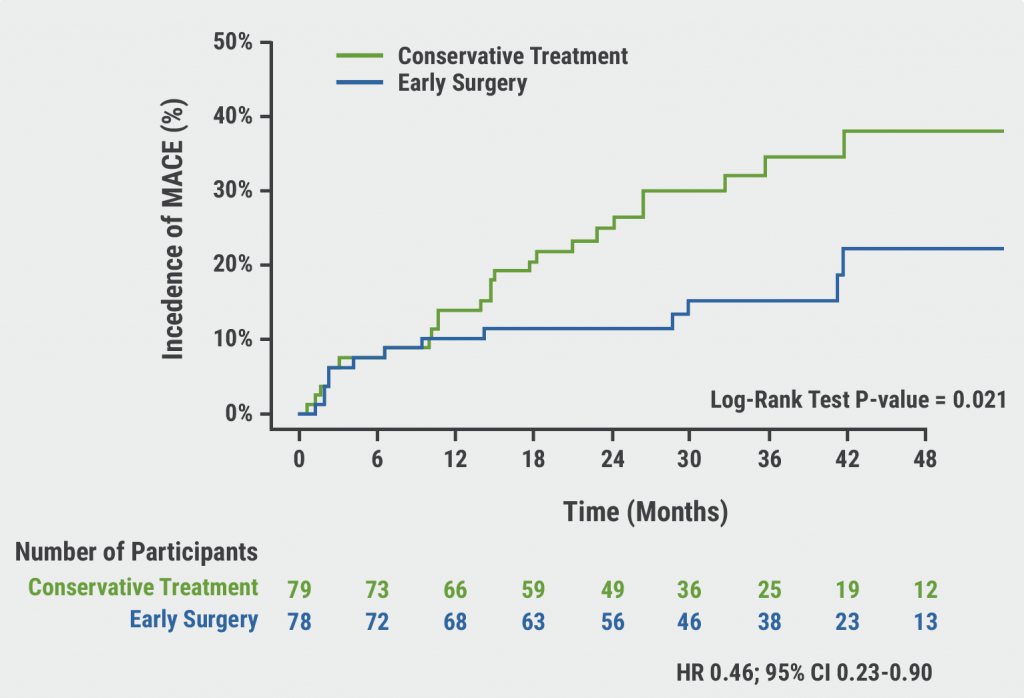https://doi.org/10.55788/d8c2afb9
The FRAME-AMI trial (NCT02715518) trial, presented by Dr Joo-Yong Hahn (Samsung Medical Center, Seoul, South Korea), randomised patients from 14 Korean sites (n=562) with AMI and non-IRA lesion(s) to PCI with either FFR or angiography [1]. Patients with non-IRA lesions with an FFR <0.80 were treated with PCI (n=284) in the FFR arm of the trial, whereas patients with non-IRA lesions with estimated diameter stenosis >50% were treated with PCI in the angiography arm of the trial (n=278). The primary endpoint was a composite of all-cause death, MI, or unplanned revascularisation.
With a median follow-up of 3.5 years, the primary endpoint was met: an event occurred in 18 patients (7.4%) in the FFR arm and 40 patients (19.7%) in the angiography arm (HR 0.43; 95% CI 0.25–0.75; P=0.003). Furthermore, the rates of all-cause death (2.1% vs 8.5%), cardiac death (1.4% vs 8.2%), and MI (2.5% vs 8.9%) were significantly lower in the FFR arm than in the angiography arm.
Dr Hahn concluded: "Guidelines are unlikely to change solely based on the results of our trial, but in clinical practice, interventional cardiologists may choose to adopt FFR-guided decision-making in patients with acute MI and multivessel disease. In other words, FFR beats angiography for non-culprit lesions in patients with acute MI and multivessel disease.”
- Hahn JY, et al. The FRAME-AMI trial - FFR vs. Angiography-guided PCI in AMI with multivessel disease. Hot Line Session 7, ESC Congress 2022, Barcelona, Spain, 26–29 August.
Copyright ©2022 Medicom Medical Publishers
Posted on
Previous Article
« UEGW 2022 Highlights Podcast Next Article
High-dose influenza vaccine: mortality benefit? »
« UEGW 2022 Highlights Podcast Next Article
High-dose influenza vaccine: mortality benefit? »
Table of Contents: ESC 2022
Featured articles
ESC Clinical Practice Guidelines
Prevention of VT and sudden cardiac death: the new recommendations
New and first ESC cardio-oncology guideline
The 2022 ESC/ERS guidelines for the diagnosis and treatment of pulmonary hypertension
Cardiovascular assessment and management of patients undergoing non-cardiac surgery
Heart Failure
Old dogs, new tricks: Acetazolamide plus loop diuretics improves decongestion
No effect of neprilysin inhibition on cognition
Dapagliflozin DELIVERs for HFmrEF/HFpEF
Meta-analysis of DELIVER and EMPEROR-Preserved
Anticoagulation
Rheumatic heart disease-associated AF: standard-of-care holds ground
New anticoagulant safe and maybe effective: PACIFIC-AMI and PACIFIC-Stroke outcomes
AXIOMATIC-SSP: Reducing risk of ischaemic stroke with factor XIa inhibition?
Evolving evidence for P2Y12 inhibition in chronic coronary syndromes: PANTHER
Prevention
Danish study suggests starting CVD screening before age 70
Polypill SECUREs win in secondary prevention in elderly
Long-term therapy with evolocumab associated with lower CV mortality
ARBs + beta-blockers may delay Marfan syndrome aortic root replacement
ENTRIGUE: Subcutaneous pegozafermin in severe hypertriglyceridaemia
Artificial Intelligence & Digital Health – What Is New
First RCT evidence for use of AI in daily practice
AI-enhanced echography supports aortic stenosis patients
Ischaemia
Medical therapy versus PCI for ischaemic cardiomyopathy
Allopurinol disappoints in ALL-HEART
Conservative or invasive management for high-risk kidney disease patients with ischaemia?
Genotype-guided antiplatelet therapy in patients receiving PCI
Other HOTLINE Sessions
BOXing out oxygen and blood pressure targets
Coronary CT angiography diagnostics compared head-to-head
High-dose influenza vaccine: mortality benefit?
FFR-guided decision-making in patients with AMI and multivessel disease
Related Articles

January 18, 2021
Calcium chloride during CABG curbs subsequent atrial fibrillation

April 15, 2021
No age cap for lipid-lowering therapy
© 2024 Medicom Medical Publishers. All rights reserved. Terms and Conditions | Privacy Policy
HEAD OFFICE
Laarderhoogtweg 25
1101 EB Amsterdam
The Netherlands
T: +31 85 4012 560
E: publishers@medicom-publishers.com

